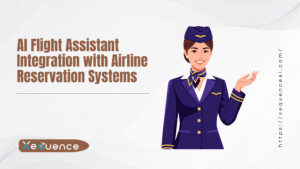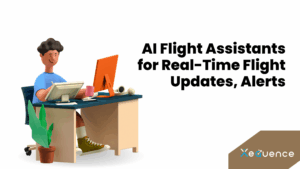- Home
- Artificial Intelligence
- The Economics of AI Flight Assistants: Lower Costs, Better Efficiency
The Economics of AI Flight Assistants: Lower Costs, Better Efficiency
- November 26, 2025
- XequenceAI
- Artificial Intelligence, Chatbot, Digital Concierge

AI Flight Assistants Cut Costs & Boost Airline Efficiency
Artificial Intelligence is transforming virtually all aspects of the travel industry; the technology that is increasingly gaining traction is AI flight assistants. Previously useful only to provide notifications and automated check-ins, these intelligent systems are quickly becoming highly powerful to personalize and simplify the whole process of travelling. This question is now on the minds and lips of many travelers as more and more airlines, travel apps, and booking platforms turn to AI to support their functions, which prompted the question: Could AI flight assistants soon be our own travel concierge?
The Emerging Impact of AI on Travel
AI assists customers in making decisions faster and less stressful, as well as lessens the burden of planning trips via predictive pricing models and smart booking tools, virtual customer service agents, etc. Various mobile apps, such as Google Travel, Hopper, or air travel services, are now doing the same with augmented AI which predicts changes in fares and delays and offers suggestions depending on how the traveler acts.
The next frontier however is the flight assistants which are AI systems that are meant to assist travellers before, during and after their flights. When they are no longer passive information sources but they are rapidly becoming active travel associates.
What AI Flight Assistants Are Capable of as of Today?
AI assistants have already been implemented by many airlines and travel platforms to facilitate the process of performing routine tasks and improving the journey of the passengers. The existing abilities have been given below.
Real-Time Flight Updates:
AI assistants help to keep track of live data streams in order to issue real-time notifications about delays, gate changes, and boarding times. This is automated by apps such as TripIt Pro, airline catbots and so on, and travelers will never miss a very important update.
Smart Booking Management:
The use of AI can assist in rebooking a flight in case of disruptions, suggest alternative routes, and inform passengers that lower prices exist. It even automated check-in on some of the platforms and created digital boarding passes.
Personalized Recommendations:
A large number of travel applications now apply AI to recommend hotels, destinations, or upgrade deals, depending on user preferences and previous ways of travel.
Customer Support Auto-Support:
The Airline Chabot’s, found in the service of United, Delta, and Qatar Airways, respond to inquiries, solve simple problems, and increase the pace of support interactions, which occupy less time than the provided wait time to travelers. This is not the end of this functionality.
Helpful Assistant to Personal Travel Concierge:
The next generation of AI will be much further than notifications and robots. With the recent breakthroughs in natural language processing and real-time data analytics, the AI flight assistants would be able to become actual travel concierges in the nearest future—intuitive, proactive, and tailored to the specific needs.
Hyper-Personalized Itinerary Planning:
A personalized itinerary chooses hotels and flights as per the desired schedule. We suggest you create itineraries that will suit your preferences.
The Benefits of AI Travel Concierges
When AI systems become more mature, both travelers and airlines will enjoy the increasing power of AI systems.
Greater Convenience
These benefits help travellers save time and decrease stress since AI can take care of tedious procedures such as keeping up with delays, rebooking, finding an upgrade, and following up on luggage.
Personalized Experiences
Artificial intelligence can be trained to know what a traveler wants, to a startling degree of accuracy, and give a recommendation that seems to have come from a human professional.
Improved Travel Efficiency
AI can make travel processes smoother, accelerate trips, and avoid delays by considering millions of data points, including weather conditions and traffic congestion at airports, to propose more intelligent options and organize a trip.
Cost Savings
Predictive analytics can assist travellers to get the most favorable offers on the flights and accommodations, as well as allow the airlines to streamline their performance with the assistance of artificial intelligence.
Privacy Concerns
Artificial intelligence assistants need to have access to much personal information to work. It will be important to guarantee a high level of privacy and transparency in data policy.
Technology Dependency
Travellers can become increasingly reliant on automated systems as AI increasingly takes center stage in travel—asking them what they will do when the machines stop functioning.
Digital Accessibility
Travelers are not always at ease using AI. The availability of such systems should also be optional and easy to use to ensure that some passengers are not left behind.
Airline Integration
Airlines need to invest in matching technologies in terms of AI concierge to work across platforms. This needs serious infrastructure upgrades that may be variously developed in the world.
Conclusion
It is obvious that AI flight assistants are developing at an impressive rate. These features can now assist in activities such as tracking flights and managing bookings, but in the future, they could transform the travel experience. There is a high probability that AI will become more human-like, conversational, and predictive: it will be able to plan whole trips, overcome challenges in a real-time situation, and provide the type of personal approach that is usually only possible with high-level travel concierge services.
Recent Posts
5 Myths About AI in Hospitality Operations | Facts Every Hotelier Should Know
Newsletter
Get regular updates on data science, artificial intelligence, machine
You may also like

Al Flight Assistant Integration with Airline Reservation Systems

The Future of Hospitality Operations: AI Trends to Watch

AI Flight Assistants for Real-Time Flight Updates, Alerts




